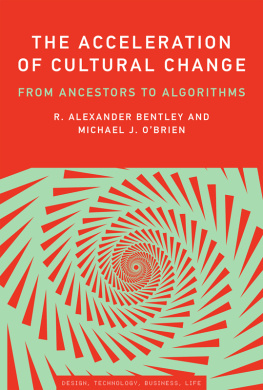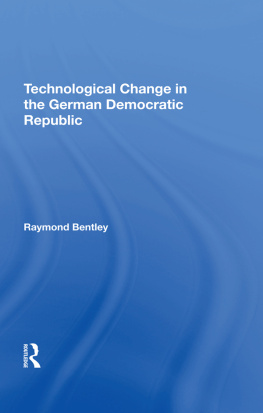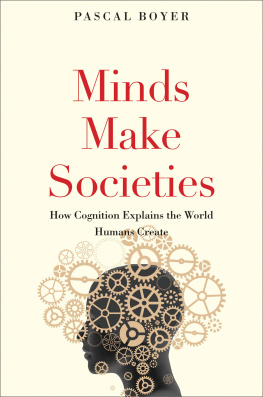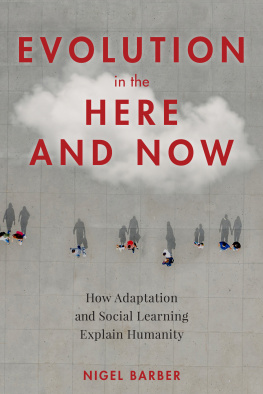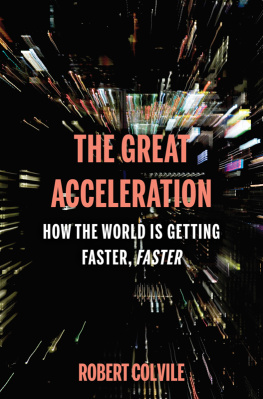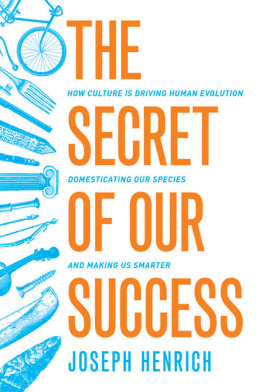
Simplicity: Design, Technology, Business, Life
John Maeda, editor
The Laws of Simplicity, John Maeda, 2006
The Plenitude: Creativity, Innovation, and Making Stuff, Rich Gold, 2007
Simulation and Its Discontents, Sherry Turkle, 2009
Redesigning Leadership, John Maeda, 2011
Ill Have What Shes Having, Alex Bentley, Mark Earls, and Michael J. OBrien, 2011
The Storm of Creativity, Kyna Leski, 2015
The Acceleration of Cultural Change: From Ancestors to Algorithms, R. Alexander Bentley and Michael J. OBrien, 2017
The Acceleration of Cultural Change
From Ancestors to Algorithms
R. Alexander Bentley and Michael J. OBrien
Foreword by John Maeda
The MIT Press
Cambridge, Massachusetts
London, England
2017 Massachusetts Institute of Technology
All rights reserved. No part of this book may be reproduced in any form by any electronic or mechanical means (including photocopying, recording, or information storage and retrieval) without permission in writing from the publisher.
This book was set in Scala Sans and Scala by Toppan Best-set Premedia Limited. Printed and bound in the United States of America.
Library of Congress Cataloging-in-Publication Data
Names: Bentley, R. Alexander, 1970- author. | OBrien, Michael J. (Michael John), 1950- author.
Title: The acceleration of cultural change : from ancestors to algorithms / R. Alexander Bentley ; foreword by John Maeda.
Description: Cambridge, MA : MIT Press, [2017] | Series: Simplicity: Design, technology, business, life | Includes bibliographical references and index.
Identifiers: LCCN 2017006483 | ISBN 9780262036955 (hardcover : alk. paper)
eISBN 9780262343046
Subjects: LCSH: Social evolution.
Classification: LCC HM626 .B473 2017 | DDC 303.4--dc23 LC record available at https://lccn.loc.gov/2017006483
ePub Version 1.0
Foreword
John Maeda
Im pleased to present what could be easily thought of as a sequel to Ill Have What Shes Having because the two books share authors. But with what Ive learned from The Acceleration of Cultural Change I now know that thinking of the two books as related to each otherjust because one has followed the otheris an antiquated way of thinking. For a lot can happen in the six years that have followed their first book, and especially when those years are counted by the standards of Moores Law.
More than ten years have passed since the writing of the Laws of Simplicitythe iPhone had not yet been launched when the inaugural book of the Simplicity series had been published in 2006. The number of computer users didnt number in the billions, and mobile computing meant a laptop that weighed too many pounds and ran for only a few hours on a single charge. Today we live untethered, always-on, and constantly plugged-in to a myriad of machines and other human beings with what Bentley and OBrien dub as the modern Acheulean hand ax: our always ready and available smartphone. Whereas the hand ax would be used to cut, the smartphone is used to connect.
Our newfound ability to use computing to connect at scales previously unknown to humankind, is what Bentley and OBriens new book attempts to address by looking backward to enable us to see forward. They look way, way backwardas far as 1.7 million years ago to the Pleistocene-age. But you already knew this because I figured youve already looked up Acheulean hand ax, thinking you might be able to go out and buy it online at the Patagonia store. Sorry. There are so many terms and words in this book that arent coming off of a trending TechCrunch article or meme-ified in the latest futuristic TED talk. Its about a lot of old stuff that no longer has relevance in this new world today where knowledge has moved from being thin and deep in its traditional form, to now broad and shallowwhat they term as being shaped like a horizon.
Staring out at the horizon is something that I know fairly well. Ive been reaching for it to try and touch it and understand it. Although I had a front-row seat to the rise of computing within the MIT world during the 80s and 90s, I could see it leaving the realm of research and the academy, and sensing what Bentley and OBrien have done in this bookgo backward in history to reorient toward the futuresimilarly, I left MIT to go backward in time to run a classically minded art and design university. And then I went forward again into the future, by heading to Silicon Valley to work in the venture-capital industry as a partner at Kleiner Perkins Caufield & Byersthe investment firm that gave birth to companies we know today such as Google and amazon.com. After working with more than a hundred tech startups at all phases of growth, I decided to join one myself at the end of 2016 and now find myself at the tech startup Automattic, which was founded by the cofounder of the WordPress project.
So the approach that Bentley and OBrien have taken is one that makes complete sense to me, when considering how we got to where we are is the pseudo-sum total of so many technological, social, economic, and political changes that are now all impacted by Moores Law. So we need to go broad, really broad, in order to collect enough disparate data points with which to take a good enough stab at figuring out the future. What you will find in this slim, useful volume is so many dots of information scattered through time and space, and across a diverse set of cultures. And, yes, techie culture is a large ingredient in the authors analyses, so youll have a healthy dosage of knowledge dots that are familiar in 2017 such as the Internet of Things, machine learning, and, of course, Instagram and Snapchat.
In closing, I want you to know that only by my living in Silicon Valley did I come to realize how pervasive the philosophy of Apple cofounder Steve Jobs lives at the heart of tech. Its clear that his approach to life and the pursuit of knowledge was not unlike the one that the authors have taken in this book, as exemplified by Jobss famous commencement speech:
Again, you cant connect the dots looking forward; you can only connect them looking backward. So you have to trust that the dots will somehow connect in your future. You have to trust in somethingyour gut, destiny, life, karma, whatever. This approach has never let me down, and it has made all the difference in my life.
Steve Jobs, from his commencement speech at Stanford University,2005 (http://news.stanford.edu/2005/06/14/jobs-061505)
Look to the horizon. I leave your Bayesian mind to process the dots that Bentley and OBrien have curated for us. Ill be looking to the horizon together with you.
Global Head of Computational Design and Inclusion
Automattic, Inc.
Preface: In the Middleton Theater
In the late 1980s, Alexwell refer to ourselves as Alex and Mikeworked at the Middleton Twentieth Century Theater in Madison, Wisconsin. This was a 1940s corrugated-iron Quonset hut that was built in less than a week. Tickets were 99 for all seats, all shows, all times, and all ages. The movies shown were six months old and the ones almost no one still wanted to see. There was one screen, a monophonic speaker above it, and the skeleton of a rat in the basement that the manager would show to new employees.
Alex worked both the ticket booth and concession counter, and his initial responsibility was to take a dollar bill from the customer, and jam a penny and the sweaty ticket stub into the customers hand. Alex would then step back out of the booth and into the lobby to sell soda, popcorn, and Mike and Ikes to the same customer(s). In the summer, he would drag out the Toro lawnmower from a closet beneath the projection booth and go outside and mow the strip of grass behind the gravel parking lot. The manager would walk out to watch as Alex sweated in a white shirt and tie, inside a cloud of brown grass bits and flying pebbles.
Next page
